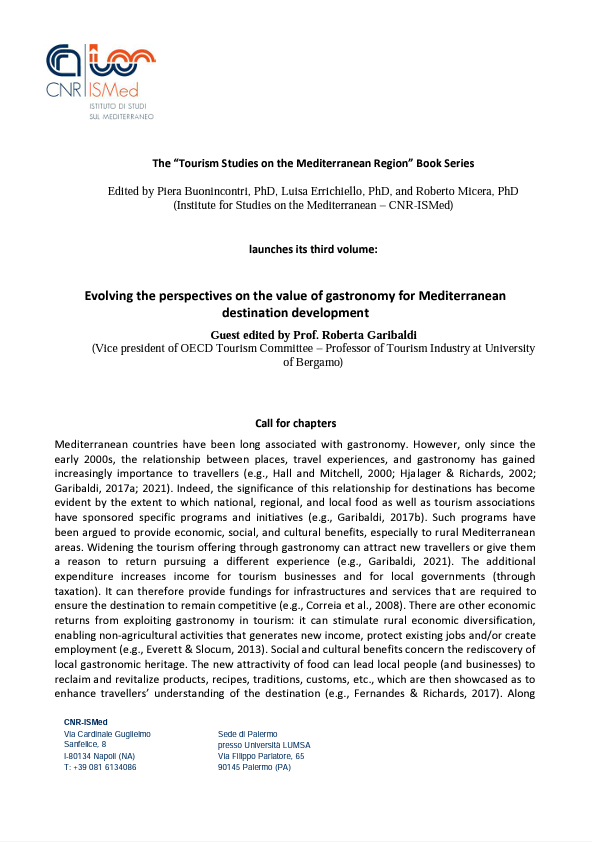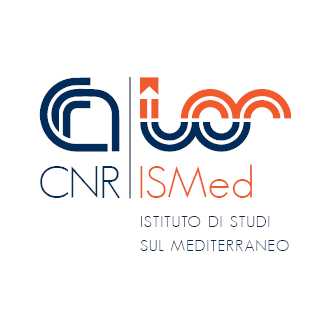Evolving the perspectives on the value of gastronomy for Mediterranean destination development
Date:
21 November 2023


The Institute for studies on the Mediterranean (ISMed-CNR) launches the Call for Chapter of the third volume of the “Tourism Studies on The Mediterranean Region” book series
Edited by Piera Buonincontri, PhD – Luisa Errichiello, PhD – Roberto Micera, PhD
“Evolving the perspectives on the value of gastronomy for Mediterranean destination development”
Guest editor: Prof. Roberta Garibaldi
(Vice president of OECD Tourism Committee – Professor of Tourism Industry at University of Bergamo)
Deadline for abstract submission: 20th February 2023
All the details and deadlines are in the call for paper.
Mediterranean countries have been long associated with gastronomy. However, only since the early 2000s, the relationship between places, travel experiences, and gastronomy has gained increasingly importance to travellers (e.g., Hall and Mitchell, 2000; Hjalager & Richards, 2002; Garibaldi, 2017a; 2021). The expansion of tourism offerings through gastronomy can generate numerous benefits for destinations and tourism organizations both at economic, social, and cultural level. Indeed, tourists’ interest in gastronomy can stimulate rural economic diversification, enabling non-agricultural activities that generate new income, protect existing jobs, and/or create employment (e.g., Everett & Slocum, 2013). Social and cultural benefits concern the rediscovery of local gastronomic heritage: the new attractivity of food can lead local people (and businesses) to reclaim and revitalize products, recipes, and traditions. Existing studies have also highlighted the main challenges related to gastronomy in tourism, including the need to satisfy diverse and varied motivations of tourists, the importance of protecting the gastronomic heritage of places, and the role of public/private and cross-sectoral collaborations.
Despite the growing interest from academia and practitioners regarding the role of gastronomy in tourism, the development processes underlying the enhancement of gastronomy in Mediterranean destinations deserve further study and investigation.
Objective of the third volume
Based on the above considerations, the aim of the third volume of the book series “Tourism Studies on the Mediterranean Region” is to offer novel perspectives on the value of gastronomy for the development of tourism destinations within the Mediterranean region. The volume also aims to enrich the discourse on gastronomy tourism by presenting interdisciplinary and multidisciplinary empirical research, both theoretically- and practice-driven.
Recommended topics
- Understanding the gastronomic experience in the context of lifestyle
- Linkages between greener lifestyles and rural wellness activities on holiday
- Emerging/niche tourism practices: Olive oil tourism, Fish tourism, tourism linked with the Mediterranean diet, and other practices
- Hybridizing gastronomic experiences
- The new digital gastronomic tourist
- The role of technologies in the gastronomic tourism experience: Metaverse, Blockchain, Human-food interfaces, Internet of Things, and other technologies
- New hybridized (i.e., mixing online and offline) gastronomic experience formats
- Perceived authenticity of gastronomic experiences
- Neuroscience and neuro marketing in gastronomy and tourism
- Broadening the perspective on gastronomic heritage preservation
- Approaches to gastronomic heritage preservation in the era of climate change
- Evolution of the gastronomic heritage and the transformation of the tourism experience
- Mechanisms to empower local communities and integrate tourists in gastronomic heritage preservation
- Bridging rural and urban areas
- Regional innovation clusters and innovative symbiosis for connecting rural and urban areas
- The physical touchpoints: Food museums, Food centres, Gastronomic hubs, Food routes and other touchpoints
- Behavioural patterns of travellers (e.g., gastronomic needs and expectations, pursued and desired activities) in seaside destinations
Last update
3 July 2025, 14:54

 CNR – ISMed
CNR – ISMed